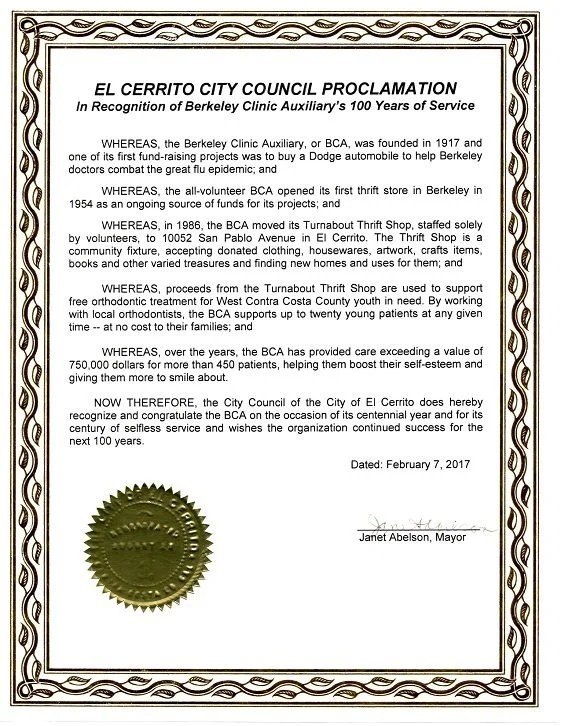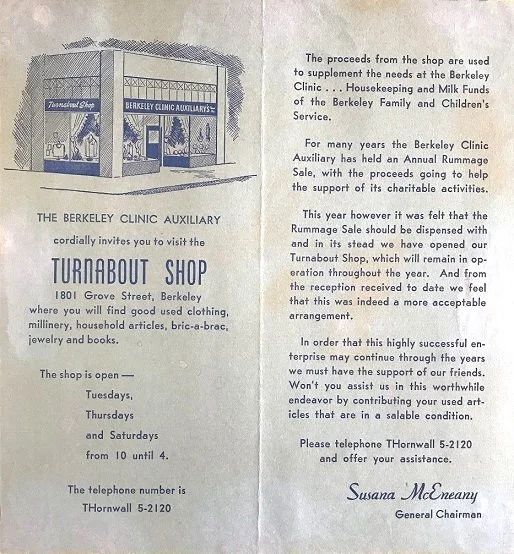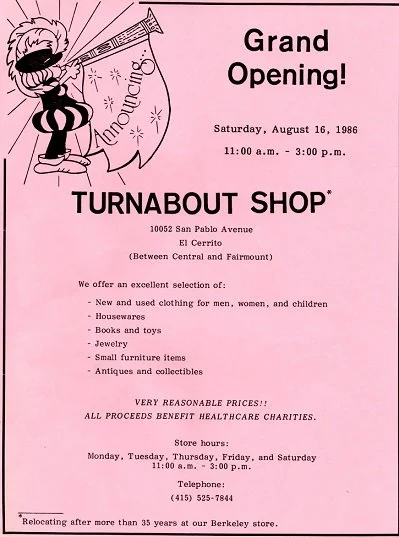El Cerrito Non-Profit, with Roots in 1918 Flu Pandemic, Working Through COVID-19
In 1918, 50 young women volunteers with Berkeley Dispensary Auxiliary began raising funds to purchase a new Dodge motor car to help nurses and social workers meet the needs of patients suffering from influenza and other health conditions during the Spanish flu pandemic. The car was purchased in early 1919 and was welcomed by the health workers who had made 8,429 home visits the year before.
The organization soon began holding annual rummage sales, including one that was held on the first two days of the 1929 stock market crash and netted $652.40, enough to erase the dispensary's outstanding debt. In 1932, the Berkeley Dispensary was renamed the Berkeley Clinic and the auxiliary continued its fundraising, primarily through annual rummage sales.
The Berkeley Clinic Auxiliary continues to raise money through the sales of donated items at the Turnabout Thrift Store at 10052 San Pablo Ave. in El Cerrito. The all-volunteer non-profit store, operated by the Berkeley Clinic Auxiliary (BCA), moved to its current location in August 1986.
In 2017, the El Cerrito City Council issued a proclamation congratulating BCA "on the occasiton of its centennial year and for its century of selfless service."
"I've been shopping at the Turnabout Shop for close to 30 years. What brought me to the shop to begin with was my goddaughter Sophie and Mirae, a friend's daughter," said Deborah Dodge, who lives in the Richmond Annex. "Both of these young women lived in single parent homes, both needed orthodontia but their single mothers didn't have the budget for it. Because of the Turnabout Shop, Sophie and Mirae have dazzling smiles and the self-confidence that a dazzling smile confers."
The store was originally established in 1954 at the corner of Grove (now Martin Luther King Jr. Way) and Delaware streets in Berkeley. Thirty-two years later, the store was paying $350 in monthly rent when the owner doubled it. The owner died soon afterward and the building was sold, with the new owner raising the monthly rent to $1,000, and then shortly afterward telling the shop it needed to move within 30 days or pay $2,000 in monthly rent. A computer store took over the premises.
Success not assured
”People in the neighborhood cried when they heard we had to leave. The store has been there so long. It's such a fixture," then-president Rosemary O'Brien told the Berkeley Voice in July 1986. "We don't know what we've lost in revenue but if we don't make it in a year in the new place, we'll have to fold."
The all-volunteer staff had just a few weeks to get the new building ready. Behind the narrow storefront adjoining the Grand Barber Shop, the building was a rabbit's warren of five rooms leading from one to the next. At one point, a door to the right leads to a dark hallway that both parallels a larger room and has a picture window looking out on the room. A smaller room behind the larger one also has a large window for viewing.
News article from the Contra Costa Times. BCA photo
One piece of the store's folklore is the building once housed a recording studio, with the large room being the performance space, the hallway allowing staff to move back and forth without disturbing the artists and the smaller room in back being the control room.
Today, the store still stretches back through four rooms filled with donated items for sale and one work room where donations are sorted and priced, board meetings are held and the volunteer staff compares notes -- or at least they did before the Covid-19 pandemic struck. New customers are surprised by how the shop looks small from the outside but just keeps going on and on.
"The Turnabout Shop has been my favorite thrift in the East Bay for years now, and I visit a lot of thrifts! It's a true, old-time thrift store and I always find something great there," said Emily Romund, who teaches elementary school in Albany.
"Our customers are very creative with their finds -- I remember one young lady who bought a pair of rhinestone earrings to decorate her black heels for prom night," said Louise O'Dea, a longtime El Cerrito resident who has been a store volunteer since 2008. "I love the idea of reusing and repurposing items in excellent shape that often cannot be found in modern stores. All this fun, for me at least, is done while helping local youngsters get dentistry or orthodontia help that they otherwise would not be able to obtain."
Preparing to reopen in the COVID-19 era
Since the store shuttered in March 2020 due to this year's pandemic, a small group of volunteers has been working to remove some of the bulkier furnishing and streamline the layout to allow for social distancing when the store reopens.
The dark narrow hallway, which had been closed off at one end and become a catch-all, has been repurposed to quarantine donations for at least 72 hours before volunteers sort through them. The two dressing rooms will also be converted to holding spaces for donations. A plexiglas shield has been installed around the cash register and a second portable shield will be purchased.
Above the front door, long-forgotten louvered windows have been reopened to provide additional ventilation. One of the last steps will be a deep cleaning of the carpet and arrangement of personal protective equipment for both volunteers and customers.
"Who would have imagined that preparing to re-open a thrift store after a pandemic would be similar to caring for hospitalized patients in isolation?," says volunteer Monica Gilliam, RN, who has advanced nursing degrees and spent 43 years in caregiver, consultant and teaching roles at various institutions around the Bay Area before retiring in January 2018. She's now applying her expertise to the reopening effort.
"Our hope is that the use of personal protective equipment, public health measures, and enhanced cleaning protocols will help reduce the spread of this virus, and just like in the hospital setting, we want to implement these safety measures in a way that helps our customers feel safe and cared for,” she says.
Through the years, the Berkeley Clinic Auxiliary had raised funds to support a variety of health-related programs, including the original Berkeley Dispensary, the Herrick Hospital Telecare program, YMCA Camperships, the Association for the Mentally Retarded and senior centers in El Cerrito, Albany and Berkeley.
The focus on dental care dates back to at least 1950, when the Berkeley Clinic opened a dental clinic in its Sixth Street building with financial support from the auxiliary. Patients were treated by Dr. James R. Hayward, a dentist from El Cerrito who served in the Army Dental Corps during World War II. By 1986, the focus had turned to providing orthodontia care to local young people in need.
More than $1 million back to the community
By the time the shop moved from Berkeley, the Berkeley Clinic Auxiliary had allocated $198,993 to provide oral care to more than 170 young patients since 1952 and was treating eight to 12 patients per year. Since the move in 1986, more than $820,500 has been allocated to help more than 255 young people in need have a reason to smile, with pediatric dentistry added to the program several years ago.
(Records for some years are missing for both the Berkeley and El Cerrito years, so the actual amounts are higher.)
Today, the success of the Turnabout store allows the Berkeley Clinic Auxiliary to support about 30 patients at a time, working with local providers to give free pediatric dentistry and orthodontia to deserving patients in the area.
While the Berkeley Clinic Auxiliary has enough reserves to continue supporting its current group of patients, volunteers are eager to get back to work, finding new homes for donated treasures. And the shop is always on the lookout for new volunteers.
"I started volunteering at BCA before my retirement and was quickly addicted. My volunteer hours vastly increased after retiring, at which point I took on various board positions," said O'Dea. "It's fun to meet and work with new people, while sorting through intriguing items, clothes and the unexpected treasures that often show up. Volunteering fulfills a need to help out the local community, and be ecologically conscious at the same time."
By Jon Bashor. This article appeared in the July 2020 issue of the Forge.
For more information on volunteering, donating items or enrolling in dental/orthodontia programs, please call the store at 510-525-7844 and leave a message.




